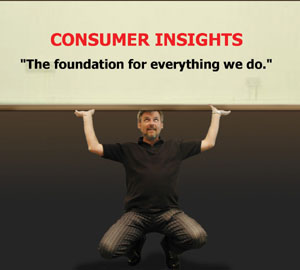Upfront: The Storytellers
Back to Contents of Issue: May 2004
|
|
|
|
by David Kilburn |
|
|
One day, the young storyteller offered to take them on a walk, away from their comfortable workplace, away from the modern suburbs to the places where people worked in factories and had less time to discuss lofty issues. He took them to visit the factories, homes, and shops where millions lived and breathed. They talked about their lives, values and dreams, and about how they spent their money. Clouds of unknowing dissolved in the sunlight.
The young storyteller was David McCaughan, who had recently joined McCann Erickson, a leading advertising agency in Sydney, Australia, after working as a children's librarian and storyteller for ten years.
This modern version of the Pied Piper story has a happy ending. Everybody returned home safely and continued with the rest of their lives, though a little changed by their experience. More guided tours to ordinary life followed, laying seeds for what has flourished thereafter. Like the piper of old, McCaughan has since traveled to many countries (but not "the caliphate of Baghdad"), and is now executive vice president of strategic planning at McCann Erickson, the leading Western advertising agency in Japan.
Planners abound in Japan, but they have such varied responsibilities it is hard to know what the title means. However, in a Western advertising agency, planning has a very specific meaning, as McCaughan explains: "Our role is to focus on a combination of what people are doing in the marketplace, what brands are about now, their potential and what you need to do to convert people into consumers of those brands. In a Western agency this work is closely associated with all that is going on in people minds, and the "-ologies" that study behavior. It is much more specific than the way the word 'planning' is sometimes used in Japan to describe jobs involving any kind of analytical work.
The word "people" gets special emphasis. "We are surrounded by people, not consumers," explains McCaughan. "There's a lot going on in their lives and brands are not always center stage. We once did a study for an Australian toothbrush maker and found that a typical Australian family might spend no more than seven minutes a year thinking about toothbrushes, though they brushed their teeth every day. As planners, we try to focus on people as people and then explore how they might become consumers of one brand rather than another," McCaughan added.
When McCaughan joined McCann in 1986, planning was a newish discipline in many agencies. His first task was to help McCann in Australia develop the techniques that would enable the agency to focus more clearly on people -- and the challenge of making brands from the agency's clients a part of their lives.
McCann Pulse™ was launched throughout Asia in 1995. Since then, many countries have been through turbulent times. There have been economic crises and social ones, such as SARS. McCann Pulse™ provides a window to view the changes. What impresses McCaughan most "is the level of resilience and personal optimism in Asia. Despite the problems they face, people retain a high level of optimism about their lives. In Japan, they might say, 'I can make it, but I'm not so sure my country can.' In Malaysia, they used to say, 'My country will make it, but I'm not so sure I can keep up,' and now they say 'I can make it, and my country probably can too.' I think this reflects that a generation of people have grown up hearing media stories about how this is the 'Asian Century.' When people witness the evidence of growth, improved living standards and prosperity as part of their own lives, the resulting optimism makes it easier to bounce back from setbacks such as SARS."
Another change: "The concept of everyday luxury is now becoming an everyday norm -- not just for the rich middle class of the West, but also in Asia," says McCaughan. "In Japan, there is polarity -- most people have cut back in some way, but they also indulge. Haagen Daz ice cream sandwiches, for example, have been very successful." Starbucks has also found success and become an agent of social change via a touch of luxury. "In Singapore, for example, people used to spend their time standing inside or walking about malls. But now they spend time sitting comfortably, talking, sipping an expensive Latte and watching the outdoors. Starbucks has brought new ways for people to meet, talk and interact," says McCaughan.
Technology crosses all borders with ease, yet there are major and interesting differences in attitudes: "Europeans are blase about technology -- 'It's great, but it won't change me.' " In the US, there is a need to know what the technology is. In Asia, people ask: 'How can I take advantage of it? How can I achieve more through it?' " Such top-line results and the wealth of detailed insight that accompanies them give McCann powerful abilities to craft campaigns for global clients that are relevant to people in different countries. Findings about broad trends and many of the details are made publicly available through a series of McCann Pulse™ Reports. However, the ways in which these can be used in helping brands fulfill their potential are best deciphered by studying the communications that McCann creates -- or looking at what people buy.
McCann Pulse™ brings together the varied threads of McCaughan's own life as a student of Renaissance Italian history, the time spent as a butler to an Italian nobleman, a yogurt maker and a menswear salesman. Maybe this is key to knowing how to handle the patterns and richness of information that he must digest. Storytelling is part of the process too. McCaughan's favorite children's author is Dr. Seuss. "The word games and rhythm make keeping kids entertained not too hard at all. And his are the kinds of stories that kids will want to listen to constantly."
@ |
|
Note: The function "email this page" is currently not supported for this page.


 Once upon a time, in a far away land, a children's storyteller found himself in a strange building where people spent their days in earnest discussion and debate about how other people lived their lives. They would pace about the large rooms, peer through windows, consult books and research reports, and debate yet again.
Once upon a time, in a far away land, a children's storyteller found himself in a strange building where people spent their days in earnest discussion and debate about how other people lived their lives. They would pace about the large rooms, peer through windows, consult books and research reports, and debate yet again.
 Within a few years, McCaughan's initial trip across Sydney to listen to people talking about their lives had evolved into McCann Pulse™, a worldwide program to monitor what people are talking about in the course of ordinary life in some 40 countries. There are weekly dialogues with individuals that may discuss topics such as: "What is the most interesting thing in life?" The media that people use, and the content of that media are examined. "For example, we look at popular magazines and TV programs such as soap operas which may teach people a great deal about fashion, home decoration, and entertaining," explains McCaughan. There are interviews with people like hairdressers and taxi drivers who also listen to people talking about their lives. Finally, McCaughan and his colleagues explore the meanings of what they have been told, and relate these to social trends and global events, finding the implications for individual brands.
Within a few years, McCaughan's initial trip across Sydney to listen to people talking about their lives had evolved into McCann Pulse™, a worldwide program to monitor what people are talking about in the course of ordinary life in some 40 countries. There are weekly dialogues with individuals that may discuss topics such as: "What is the most interesting thing in life?" The media that people use, and the content of that media are examined. "For example, we look at popular magazines and TV programs such as soap operas which may teach people a great deal about fashion, home decoration, and entertaining," explains McCaughan. There are interviews with people like hairdressers and taxi drivers who also listen to people talking about their lives. Finally, McCaughan and his colleagues explore the meanings of what they have been told, and relate these to social trends and global events, finding the implications for individual brands.




